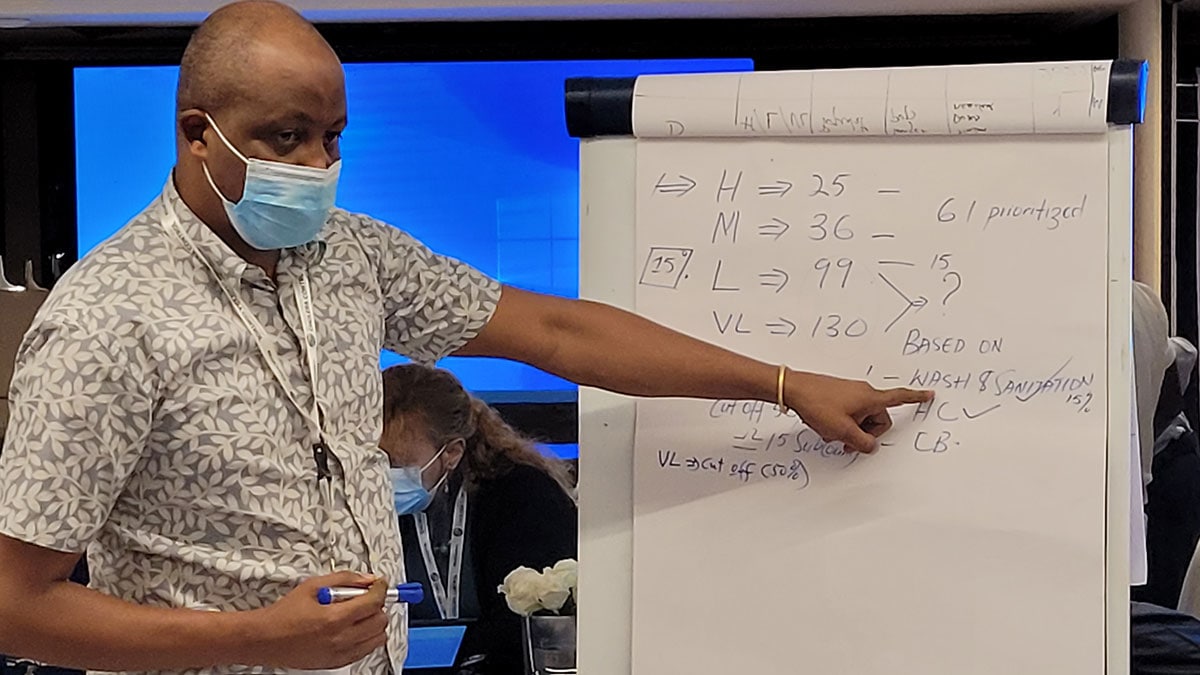Key points
- Without appropriate treatment, about 1 in 10 people with cholera will develop life-threatening symptoms that can lead to death within hours.
- Around 1.3 billion people are at risk of cholera worldwide, disproportionally affecting communities in low- and middle-income countries.

Oral cholera vaccines (OCV)
Oral cholera vaccines (OCV) can reduce cholera-related illness and death, but low- and middle-income countries face barriers to access and deliver OCV, including lengthy applications and campaign quality. To address this, CDC is actively working with countries and Global Task Force for Cholera Control (GTFCC) partners to host in-country trainings to help them apply for and use lifesaving OCVs.
Limited OCV stockpile challenges cholera control
The limited supply of OCV, which can be used to prevent and help control outbreaks, is a challenge to achieving global cholera control and elimination goals set out in Ending Cholera: A Global Road Map to 2030.
Countries do not routinely administer OCV. Instead, they must request OCV from a global stockpile established in 2016 by the World Health Organization (WHO) and other global immunization partners. As more countries prepare to start OCV preventive campaigns, the demand for OCV will increase and exceed production capacity. Ongoing large and disruptive cholera outbreaks place more demand on the OCV stockpile and can delay approved preventive campaigns.
Multi-year planning helps improve vaccine forecasting and access
By developing a multi-year plan, countries can move from using OCV as an outbreak response tool to using OCVs to prevent disease and death. These plans will allow better OCV demand forecasting and will inform manufacturing supply, thus increasing the number of doses available to countries in the future.
While global OCV supply remains limited, improving the quality of applications and OCV campaigns will improve timely delivery of vaccines to affected communities and ensure the best use of the available supply.
Training improves OCV applications and campaign quality

CDC and Global Task Force for Cholera Control (GTFCC) partners hosted an in-person and virtual training in Abuja, Nigeria in April 2022.
The goals were to:
- improve OCV applications for emergency and preventive campaigns.
- improve preventive and outbreak response campaign quality.
- support multi-year planning to prevent cholera in the highest risk populations.
Participants included public health professionals from ministries of health, WHO Expanded Programme on Immunization (EPI), and WHO Health Emergencies Programmes in Uganda, Ethiopia, Nigeria, Mozambique, Kenya, and South Sudan.
In addition to providing funding, CDC subject matter experts:
- provided organizational support.
- trained attendees and took questions.
- facilitated breakout sessions.
Dr. E. Osagie Ehanire, MD, FWACS, the Nigerian Minister of Health, provided opening remarks at the training, "I welcome you to this training as a prelude to equitable access to this vaccine, & another step towards our goal of better Health for all." [Source: WHO Nigeria on Twitter]
During the training, many participants were actively working to develop their countries' national cholera plans. Other countries were experiencing outbreaks and planned to submit OCV requests. The training provided several practical exercises in each key area, so participants could learn from experts and each other to help create stronger national plans.
CDC trainings help countries get and deliver OCV
As a result of recent trainings, the GTFCC has seen an improvement in the quality of submitted applications, including those from countries that have not previously used OCV. Additionally, some countries that attended the training in Nigeria were keen to share the training with their sub-national counterparts.
CDC and partners are offering more trainings at regional and national levels to help overcome vaccine supply challenges and minimize delays in the approval of country applications.
Countries interested in trainings may submit a request to the GTFCC at [email protected].
